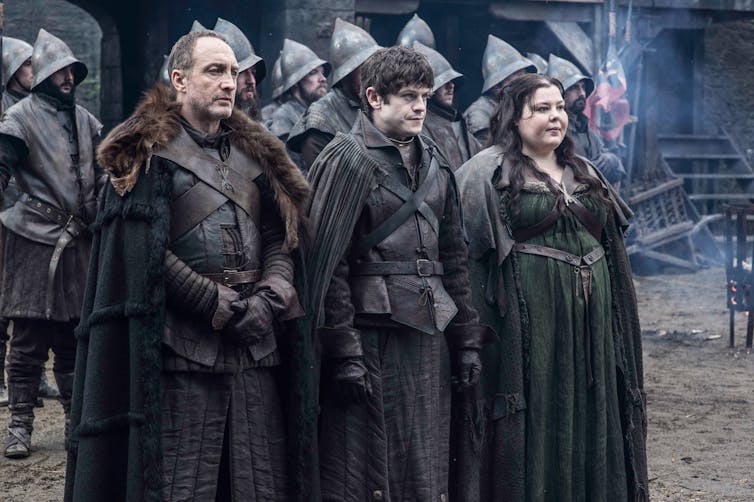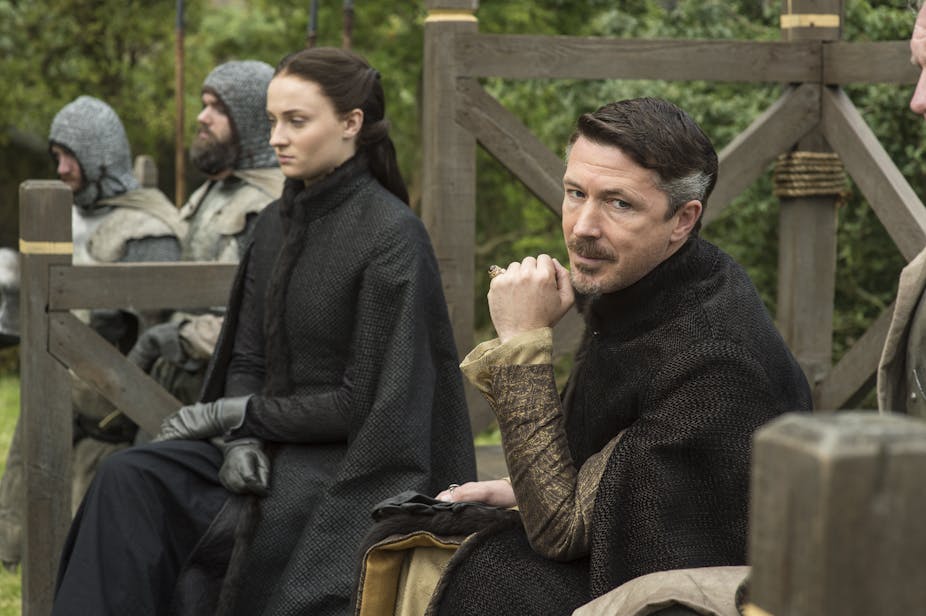Note: this article contains TV show plot spoilers up to the start of series five of Game of Thrones. It also features detail from the books (though no plot spoilers).
It’s that time of year when everyone and their dog takes a view on the most important political question of our times: who will sit the Iron Throne of Westeros?
Recently, journalist Paul Mason used Marxism to explain the game, and others have looked at George R R Martin’s work through all kinds of lenses. But funnily enough, given the title of the series, none of them uses game theory.
That’s a bit weird as right now, in a fictitious continent we’ll call Europe, a former game theory professor is running Greece’s negotiations over its debt. Given the parallels with the Iron Throne’s negotiation with the Iron Bank of Braavos (the IMF of Essos) and that bank’s willingness to commit to regime change as an enforcement strategy, you would have thought someone would link the two together.
The prisoner’s dilemma
So let’s do that now by looking at the games theory of Game of Thrones. For the uninitiated, game theory is a branch of maths that looks at problems of competition and co-operation. It assumes basic rationality and then looks at what each of the parties will achieve in a situation, conditional on other parties wanting to do their best also.
The most famous model, the Prisoner’s Dilemma, imagines a setting where police have arrested two criminals who cannot communicate with each other. The cops make them an offer over whether to betray the other or co-operate with them (another HBO show, The Wire, featured detectives who were master game theorists).
Although co-operating with each other would be a better strategy collectively, since neither party can trust the other you get an equilibrium situation where both will betray the other. This is called a Nash Equilibrium – the best that each party can get, conditional on the other trying to get the best they can also.
It’s more complicated than that
The problem when looking at Westeros is that at any point there are multiple games going on.
The race for the Iron Throne is one. Another is the relationship between the Iron Bank and the Crown. Another involves playing for the position that enables playing the Game of Thrones in the first place – think Roose Bolton trying to supplant the Starks in the North. Yet another involves whatever it is that Danaerys is doing in Meereen. And finally there is the game that few even know they are playing, where the enemy appears to be the mysterious White Walkers.

This set-up mirrors the multiple sets of incentives on politicians and institutions in real-world statecraft, and makes it devilishly difficult to model the whole system.
Zoom in
Instead, you can think about some of the subgames, which are a little more clear cut in their outcomes. Game theory doesn’t look at behaviour so much as it looks at outcomes, assuming that people will choose the highest payoff if they can.
Martin even helps on a couple of occasions by spelling out those payoffs. Advising Joffrey, the fearsome Tywin Lannister gives a great example of what to do in a repeated game:
Joffrey, when your enemies defy you, you must serve them steel and fire. When they go to their knees, however, you must help them back to their feet. Elsewise no man will ever bend the knee to you.
This is a pretty good distillation of a what game theorists call tit-for-tat. If you start off with equal participants in a repeated game, the best overall strategies combine punishing transgression with forgiveness; there are variants, but all of them get better results than “all or nothing” punishment strategies such as the grim trigger.
Tywin’s strategy works in this case because it assumes a capability for punishment. In advising Joffrey, he’s not telling him how to gain the Iron Throne but how to hang on to it. The equilibrium stays stable as long as the Throne can dominate all of the potential competitors, as Aegon I could with his dragons. Then, rebellion is easily put down, and whatever the consequence to the smallfolk of Westeros, at least they don’t get the kind of devastation inflicted on the Riverlands by the War of the Five Kings.

Interestingly, this is often the case in situations where it seems desirable to get rid of a tyrant. If the presence of the tyrant is the only thing that keeps a stable equilibrium, then getting rid of the tyrant just disrupts the equilibrium and leads to all out conflict. You could draw on examples like Iraq after Saddam Hussain, or Yugoslavia after Tito, but it also applies to some situations with non-state actors like organised crime syndicates – and indeed company succession after a dominating figure retires.
Better the devil you know?
But once the tyrant is out of place, a different, more fluid and more dangerous situation takes place, which is why binding the great houses together through marriage pacts would be so important. Historians of Westeros would, I’m sure, have in-universe arguments over whether deposing “mad king” Aerys was a case in point.
The marriage pact between the Lannister and Baratheon houses has held for 14 years by the time the series starts, but it is fragile, and many of the houses have reasons to want to get involved. The death of king Robert Baratheon in series one starts off the War of the Five Kings.
Of course if one party has a weapon of mass destruction, then this equilibrium is supported. Danaerys Targaryen has those weapons, but she is not playing in this game yet as she’s halfway around the globe from the action in Westeros. However, she is also learning the limits of dragons as a credible threat – using them to keep the peace in Westeros is one thing, but being cooped up in a city with your rivals takes dragons out of play as you can’t burninate the city without burning yourself too.
The threat is non-credible in game theoretic terms because you would not choose the payoffs that come from playing the threatened strategy – in this case probably destroying your own territory, but probably not destroying your enemy. The characters in Game of Thrones even have an in-universe example to guide them here: Aegon’s failure to conquer Dorne, in southern Westeros.
Theory can’t tell us everything
But Game of Thrones also points to some of the limits of game theory. When the UK’s foreign office issues advice on a regime undergoing uprising and doesn’t quite know the likely outcomes, it always uses that wonderful adjective “fluid”. The situation in Westeros remains fluid as long as some of the players are not rational; the master of statecraft Tywin is one thing, but playing against Cersei?
The payoffs are uncertain too: it’s not necessarily the case that someone winning the Iron Throne – without dragons – would be able to hold it at all now. And there are some potential players who haven’t yet revealed their hands. We have some idea about Littlefinger, but what is Varys’ game? Westerosi politicians have to cope with something a bit more complex than a prisoner’s dilemma.
That brings it all back to one of the problems with using game theory or any type of model to try to analyse a situation as complex as the one George Martin created. When payoffs are computable in some way, then game theory works really well. But politics is often about unexpected turns.

In the 1970s, political scientist Giovanni Sartori described a certain kind of political alignment that tended to produce big regime downfalls such as Weimar Germany or Salvador Allende’s Chile or the French Fourth Republic. The next predicted upheaval would have been Italy, and indeed Italy might indeed have come close to collapse. But what he didn’t expect was that the Italian communists would turn round and do a deal with their rivals to preserve the state. They did just that – the Historic Compromise – and Italy limped on.
In Game of Thrones, the in-universe board game of cyvasse is used to explore these situations. Like chess, it seems to be finite, and therefore fully complete under game theoretic classifications. But politics is like playing without knowing how many boards there are, how many players there are and with a board that changes size and shape all the time. While Game of Thrones is full of strategy, and full of situations that you could look at with game theory, the overall game points to its limitations in application.
Read this next: Why hasn’t Westeros had an industrial revolution?

